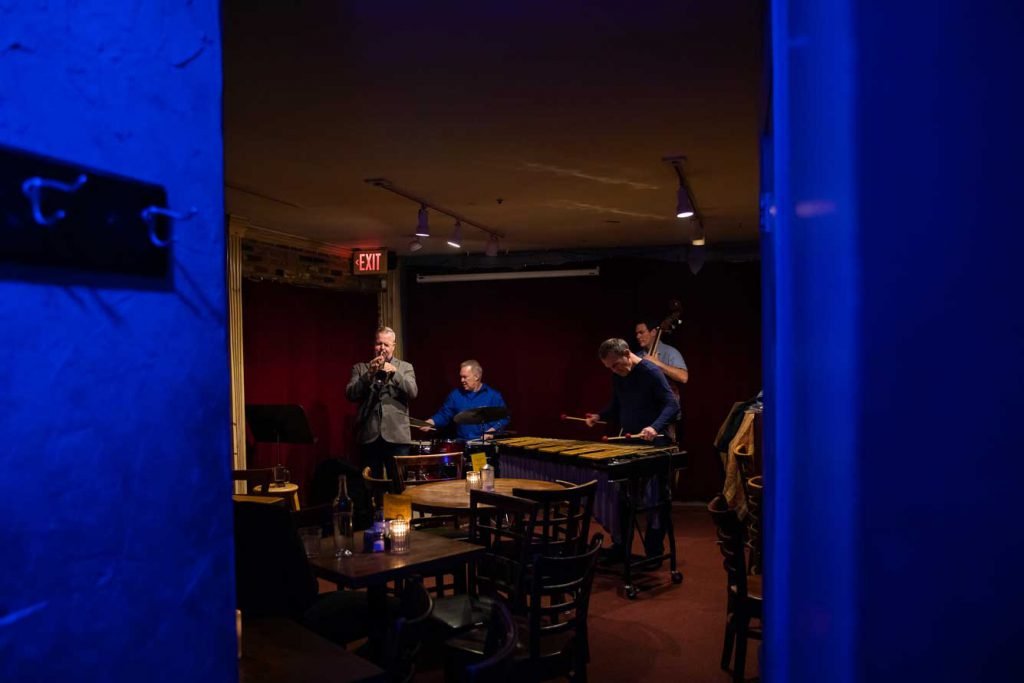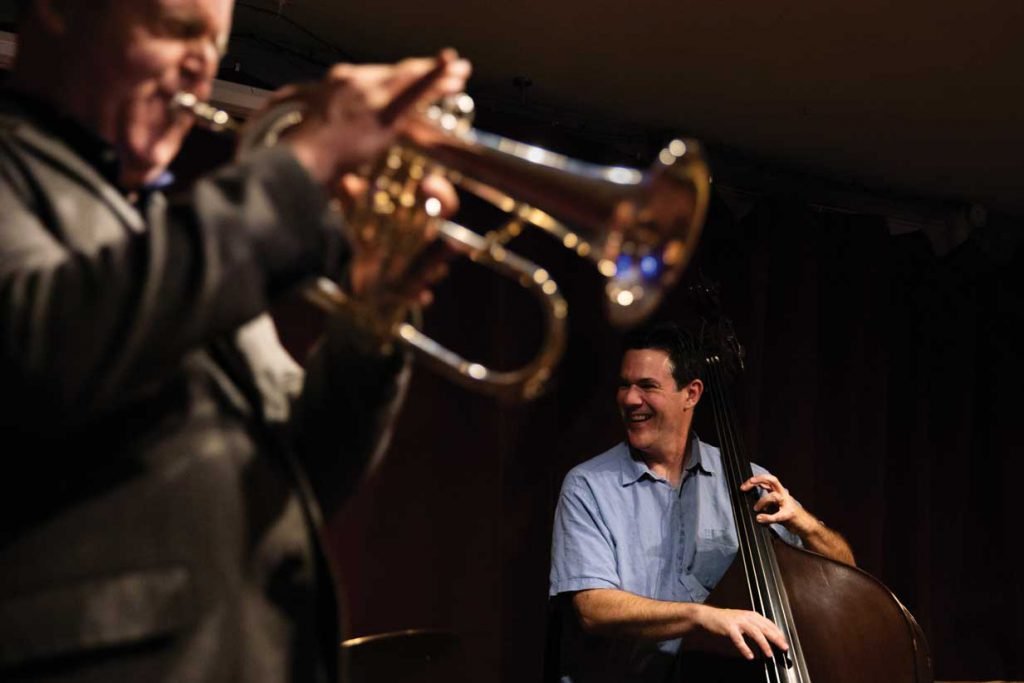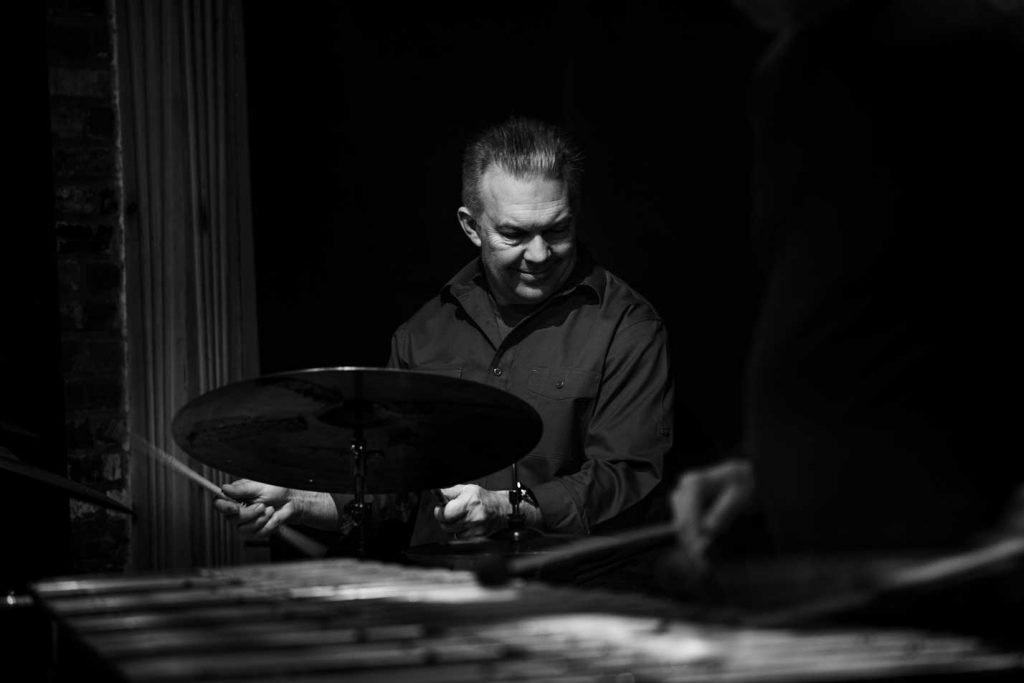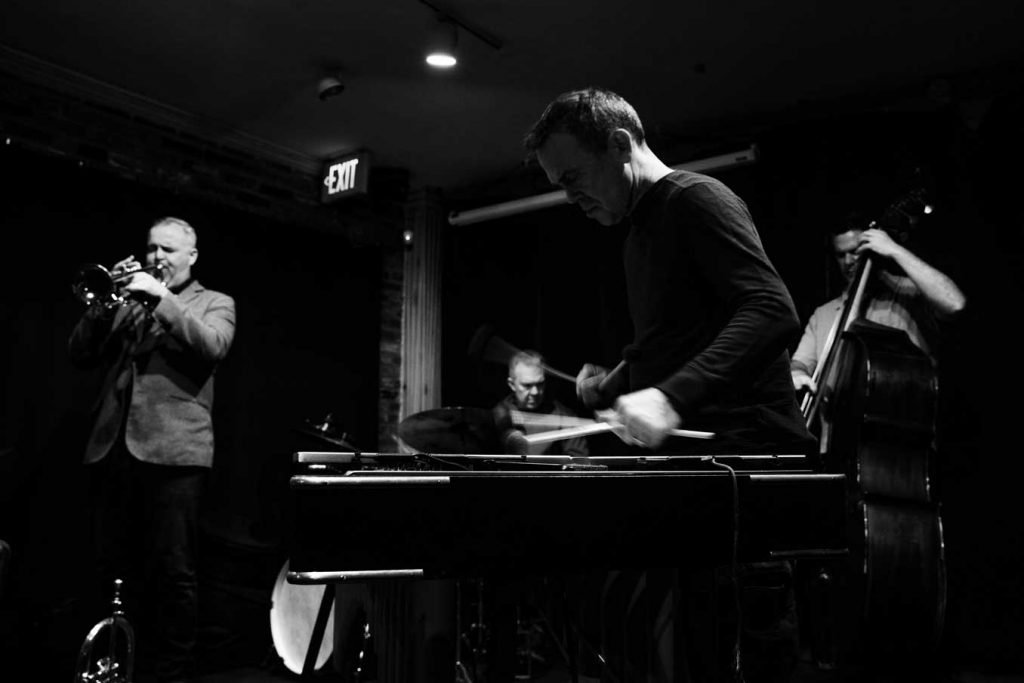+ By Leah Weiss + Photos by Sarah Jane Holden
“Those guys are world class,” says musician and recording engineer Noel White. “They are very fluid, they know each other so well. Jazz is supposed to breathe and be a conversation—they are four guys having a beautiful conversation that complements each other.”
Since New Year’s Day 1997, Unified Jazz Ensemble (UJE) has been playing in the back room of 49 West Coffeehouse, Winebar & Gallery once a week. Though the night has moved from Wednesday to Tuesday and personnel have shifted, the basics remain: extraordinary musicianship, compellingly rendered tunes, and playful patter. “They are as good as anybody I’ve seen anywhere in the world, on any given stage,” says White, who worked as stage manager and band technician for jazz luminary Herbie Hancock.
“UJE is always a joy to see,” says Andy Bienstock, jazz host at WYPR. “They’ve played together so long that they can read each other’s minds—but there’s no coasting, every performance is fresh.” The group delivers with clarity, intensity, and understatement. Dynamics are graceful while solos are seamlessly passed around, each member supporting the other as if knowing firsthand where the lead will go. The band never follows a predetermined set list. “That kinda gets in the way, it boxes us in,” says vibraphonist Mike Noonan. “Instead, we read the room and assess what song should follow.” Bass violinist John Pineda explains that the set has an arc, and they want the audience to be able to differentiate what happens on every piece. Band members take turns calling the tunes, each composition presenting varying textures, rhythms, and cadences, creating different ambiances.
In 1992, while finishing a graduate program in music at University of North Texas, Noonan was asked if he’d like to put together a band to serve a 10-month residency in Decorah, Iowa. The tiny Midwestern city had been accepted into the National Endowment for the Arts (NEA) Chamber Music Rural Residencies Program and requested a jazz ensemble, as it was devoid of jazz. NEA was happy to expand its program, and Noonan jumped on the assignment, pulling together a quintet of colleagues, some from North Texas and others from his undergraduate days at Berklee College of Music in Boston, Massachusetts.
Noonan’s choice of band name was purposeful. “It says what we try to do, as a collective,” he says. “We all bring in originals, we create arrangements. I follow these guys just as much as they follow me, musically. We’re truly an ensemble.” NEA’s program had them teaching and mentoring in the public schools, writing compositions, and performing in the community. “We felt the impact we had, Decorah really embraced us,” says Noonan. The residency was extended for another year, and today the city still hosts local jazz performances.
When the group moved to Blytheville, Arkansas, in 1994 for another NEA residency, Pineda became its bassist. Born into a musical family—his father performed and his grandfather opened a conservatory—Pineda met and played with Noonan during his undergraduate days at North Texas. The two have a palpable connection: on stage, Pineda will almost imperceptibly wander alongside Noonan’s solo for a few beats, moving back into foundational lines within seconds. Both are quick-witted, bantering with those around them, playing off each other verbally in rapid succession.
After the Blytheville residency concluded in 1996, UJE moved en masse to Annapolis to continue working together. Noonan, who serves as the band’s booking agent and factotum, walked the city’s streets, looking for venues. When he came upon 49 West’s empty back room, he saw its potential.
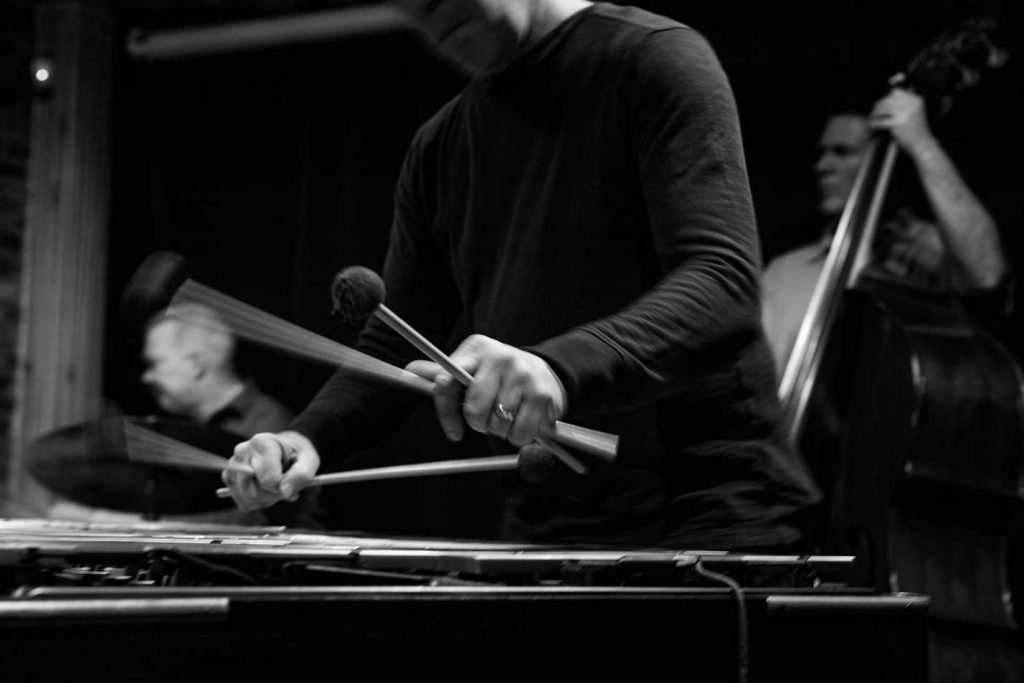
49 West co-owner and jazz aficionado Brian Cahalan knew that UJE would be a perfect fit. Having such a quality group playing weekly also put a spotlight on his newly opened café as a performance space. “They helped legitimize us so that other serious musicians and artists would want to come here, perform, and be part of the 49 West family,” he says.
Initially, UJE went on 30-day tours yearly but pared its road time after becoming established. Several musicians active in Annapolis’ music scene have been band members over the years, including Jeff Antoniuk, Marty Morrison, Dominic Smith, Tim Leahy, Mike Pavone, Tedd Baker, and Paul Pieper.
Tim Stanley, UJE’s trumpeter, initially came to Annapolis from Rhode Island in 2001 for a position in the Naval Academy Band and then joined the prestigious Navy Band Commodores, playing big band jazz. In 2008, he became a part of UJE on top of his full-time Navy gig. He once managed to juggle an 11-day UJE tour into his schedule. “Sometimes it feels busy, and sometimes a month goes by and is super busy but doesn’t feel crazy,” says Stanley, smiling.
Drummer Frank Russo joined UJE three years ago. Another seasoned musician with an impressive resume, including teaching at Towson University, he plays with other ensembles around Annapolis. “When I joined this band, I couldn’t believe how large the repertoire is,” he says. “They have a wide variety. It’s a deep book and mostly memorized.”
Says Pineda about the band after Russo joined, “It just seems like it all clicks. He has the same musical background.” Stanley elucidates: “I’ve always thought of jazz and improvisation as kind of a language, and we’ve all grown up learning the same language, listening to the same masters of that language. Each of us has developed our own voice, but you can talk to anybody anywhere that speaks your language, and we can play together in that way.”
UJE just released its eleventh album, Standards . . . basically, recorded at White’s studio, Hudson Street Sound. “They work super fast,” says White. “They know their material, so they come in, and it’s like capturing lightning in a bottle—I’ve got to be ready for them, and it’s got to work because it’s gonna be one of the first two [live] takes.” The new recording features jazz standards, a departure from previous recordings. “We put a lot of thought into how we’re going to take a standard that’s been played a million times and tailor it to the sound of our group and the sound of the members of our group,” says Noonan.
To make a living as musicians, they work constantly, sometimes gigging twice a day, five to seven days a week. They play in various combinations, with each other and with other groups, something Pineda says helps keep UJE’s music fresh and broadens repertoire. “It affects what we bring back in on Tuesday nights—somebody might bring a new tune, an arrangement of something we already know, or a rhythmic idea that they just happened to play at a gig with somebody.” Tuesdays at 49 West is UJE’s priority gig. Says Noonan, “We all try to protect this night so that we can all be there.”
“They have so many musical connections, friends who play all over the world,” says Cahalan. “It’s always fun when their friends stop by, feeling that excitement and exuberance through the music.” Once, after legendary trumpeter Freddie Hubbard played at Rams Head On Stage, Hubbard’s baritone saxophonist, who went to school with Noonan, brought Hubbard and members of his band over to UJE’s Tuesday night gig. “There was a cutting contest,” says Cahalan, referring to when musicians spar with each other on improvisational solos. “It was Tim Leahy versus Hubbard’s trumpeter, and Leahy just cut him out! It was all in good fun. That’s what you live for, those kind of nights.” █
Learn more about Unified Jazz Ensemble, its recordings, and its upcoming shows at
www.unifiedjazz.com.


